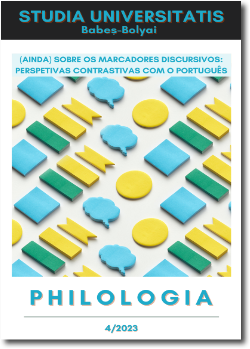O PRINCÍPIO DA MARCAÇÃO NOS MARCADORES DISCURSIVOS DE BASE VERBAL VIU? E ENTENDEU? DO PORTUGUÊS BRASILEIRO
THE MARKEDNESS PRINCIPLE IN BRAZILIAN PORTUGUESE VERB-BASED DISCOURSE MARKERS VIU? AND ENTENDEU?
Author(s): Sérgio Duarte Julião Da SilvaSubject(s): Descriptive linguistics
Published by: Studia Universitatis Babes-Bolyai
Keywords: discourse markers; functionalism; cognitive linguistics; markedness; teaching Portuguese to speakers of other languages;
Summary/Abstract: The markedness principle in Brazilian Portuguese verb-based discourse markers viu? and entendeu?. A productive, vigorous debate on grammar issues took place as the new millennium approached. A significant amount of work was published in that field as we witnessed a grammatical boom between 1991 and 2014 in Brazil (Faraco and Vieira 2016). Along with a resulting new range of descriptive perspectives and propositions, the debate over discourse markers (DMs) relevance has increased sharply among language curriculum professionals. Although they have played an important role in functionalist grammars where interaction is a key component, DMs are still regarded as a peripheral category in natural language normative grammars. Also, DMs are typically associated with language users’ social status. Based on cognitive-functionalist grammar studies, my research has placed DMs on the common ground between a functionalist framework (by investigating the relationship between form and content) and cognitive linguistics theory (categorization, prototypicality, conceptual metaphors). This paper explores some of my research findings on the markedness principle as applied to Brazilian Portuguese DMs viu? and entendeu? in the light of cognitive-functionalist theories. Some contrast between these DMs and their English equivalent is also explored. In doing so, I hope to bring forward new resources to explore verb-based DMs in teaching Portuguese to speakers of other languages.
Journal: Studia Universitatis Babes-Bolyai - Philologia
- Issue Year: 68/2023
- Issue No: 4
- Page Range: 55-76
- Page Count: 22
- Language: Portuguese

